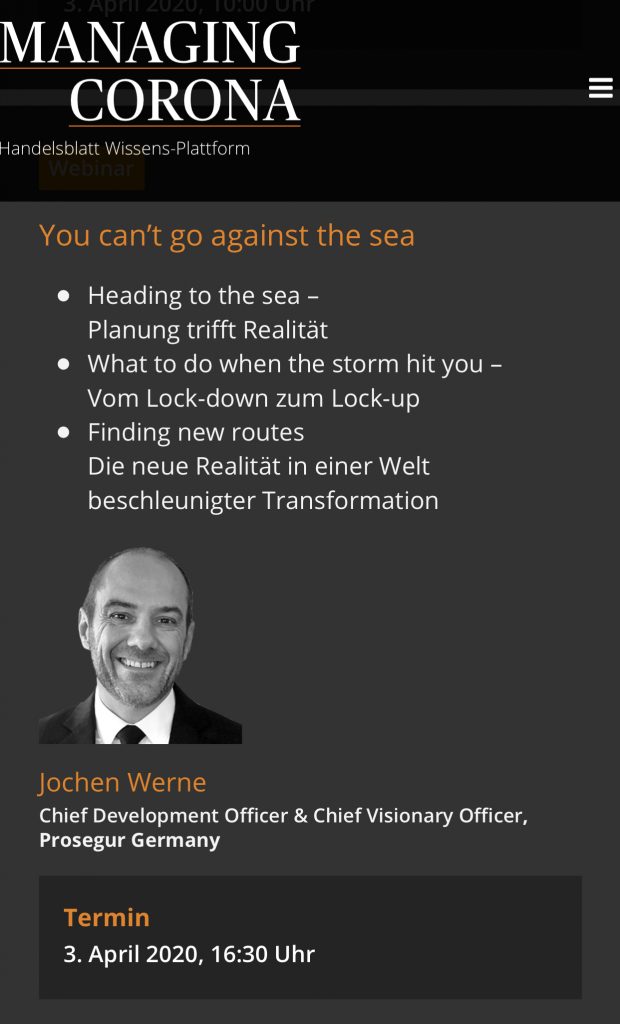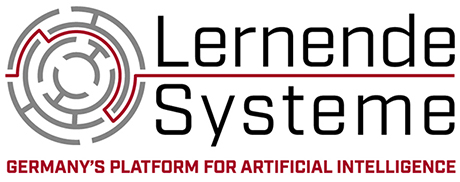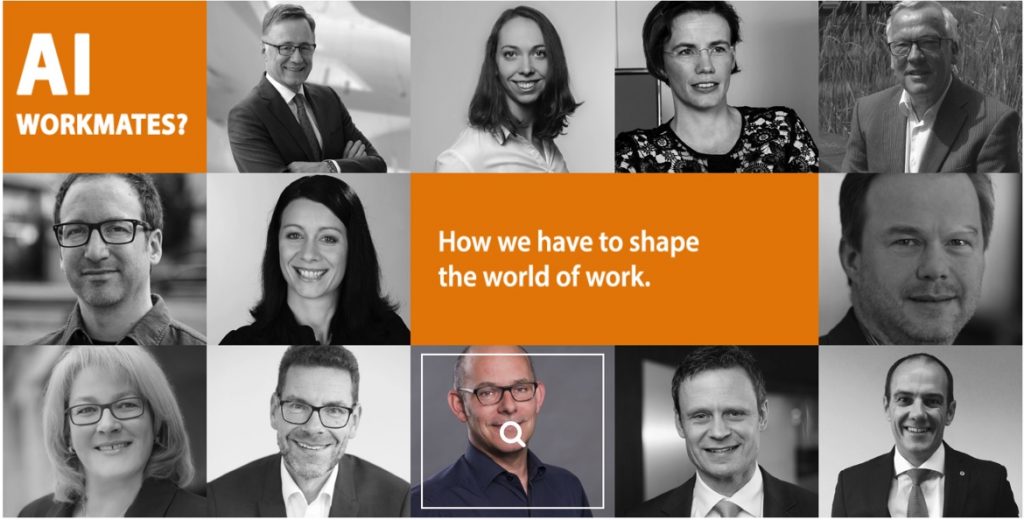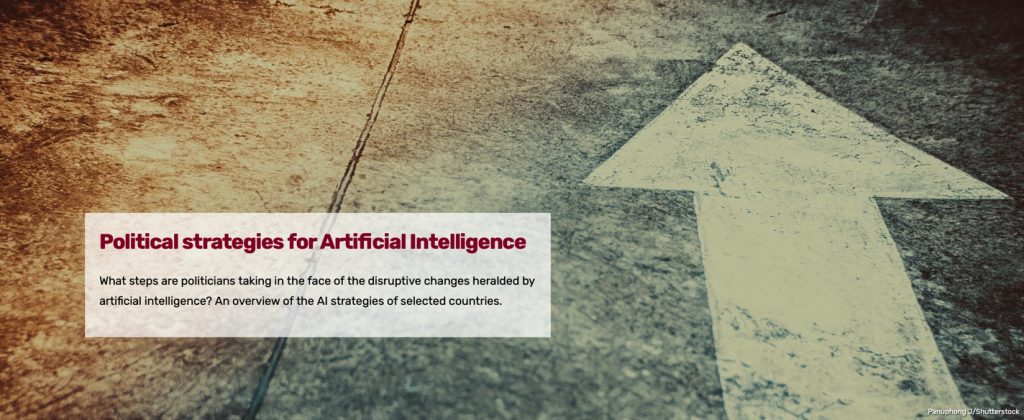Enjoy a glimpse of the thrills awaiting the men aboard their expeditionary sailing yacht in the North Sea with this introductory trailer featuring moments from previous GOST missions.
NORTH SEA ENDURANCE TRAILER

Enjoy a glimpse of the thrills awaiting the men aboard their expeditionary sailing yacht in the North Sea with this introductory trailer featuring moments from previous GOST missions.
NORTH SEA ENDURANCE TRAILER
Design approaches for change management
About this whitepaper
This paper was prepared by the Work/Qualification, Human-Machine Interaction working group of the Learning Systems Platform. As one of a total of seven working groups, it examines the potentials and challenges arising from the use of artificial intelligence in the world of work and life. The focus is on questions of transformation and the development of humane working conditions. In addition, it focuses on the requirements and options for qualification and lifelong learning as well as starting points for the design of human-machine interaction and the division of labour between man and technology.
Original published in German. Translation made by Deepl.com
Authors:
Prof. Dr.-Ing. Sascha Stowasser, Institut für angewandte Arbeitswissenschaft (ifaa) (Projektleitung)
Oliver Suchy, Deutscher Gewerkschaftsbund (DGB) (Projektleitung)
Dr. Norbert Huchler, Institut für Sozialwissenschaftliche Forschung e. V. (ISF-München) Dr. Nadine Müller, Vereinte Dienstleistungsgewerkschaft (ver.di)
Dr.-Ing. Matthias Peissner, Fraunhofer-Institut für Arbeitswirtschaft und Organisation (IAO) Andrea Stich, Infineon Technologies AG
Dr. Hans-Jörg Vögel, BMW Group
Jochen Werne, Prosegur Cash Services Germany GmbH
Authors with guest status:
Timo Henkelmann, Elabo GmbH
Dr.-Ing. habil. Dipl.-Tech. Math. Thorsten Schindler, ABB AG Corporate Research Center Germany
Maike Scholz, Deutsche Telekom AG
Coordination:
Sebastian Terstegen, Institut für angewandte Arbeitswissenschaft (ifaa) / Dr. Andreas Heindl, Geschäftsstelle der Plattform Lernende Systeme / Alexander Mihatsch, Geschäftsstelle der Plattform Lernende Systeme
The introduction of artificial intelligence (AI) in companies offers opportunities and potential both for employees, for example in the form of relief through AI systems, and for companies, for example in the form of improvements in work processes or the implementation of new business models. At the same time, the challenges in the use of AI systems must – and can – be addressed and possible negative accompanying implications dealt with. The change in the companies can only be mastered together. All in all, it is a matter of shaping a new relationship between people and technology, in which people and AI systems work together productively and the respective strengths are emphasised.
Change management is a decisive factor for the successful introduction of AI systems as well as the human-centred design of AI deployment in companies. Good change management promotes the acceptance of AI systems among employees, so that the potential of new technologies can be used jointly for all those involved, further innovation steps can be facilitated and both employees and their representatives can be made the shapers of technological change.
The participation of employees and their representatives makes a significant contribution to the best possible design of AI systems and the interface between man and machine – especially in terms of efficient, productive work organisation that promotes health and learning. Early and process-oriented participation of employees and co-determination representatives is therefore an important component for the human-centred design and acceptance of AI systems in companies.
The introduction of artificial intelligence has some special features which also have an impact on change management as well as on the participation of employees including the processes of co-determination in the company. The authors of the working group Work/Qualification, Human-Machine-Interaction pursue with this white paper the goal to sensitize for the requirements of change management in Artificial Intelligence and to give orientation for the practical implementation of the introduction of AI systems in the different phases of the change process:
Phase 1 – Objectives and impact assessment: In the change processes for the introduction of AI systems, the objective and purpose of the applications should be defined from the outset with the employees and their representatives and information on the functioning of the AI system should be provided. On this basis, the potential of the AI systems and the possible consequences for the company, the organisation and the employees can then be assessed. A decisive factor for the success of a change process is the involvement of the employees and the mobilisation for the use of new technologies (chapter 2.1).
Phase 2 – Planning and design: In a second step, the design of the AI systems themselves is the main focus. This is primarily concerned with the design of the interface between man and AI system along criteria for the humane and productive implementation of man-machine interaction in the working environment. Of particular importance here are questions of transparency and explainability, of the processing and use of data and of analysis possibilities by AI systems (including employee analysis) as well as the creation of stress profiles and the consideration of employment development (Chapter 2.2).
Phase 3 – Preparation and implementation: The AI systems must also be integrated in a suitable way into existing or new work processes and possibly changed organisational structures. This means preparing employees for new tasks at an early stage and initiating the necessary qualification measures. It is also important to design new task and activity profiles for employees and to adapt the work organisation to a changed relationship between man and machine. A helpful instrument in the introduction of AI systems are pilot projects and expert phases in which experience can be gathered before a comprehensive introduction and possible need for adaptation with regard to AI systems, qualification requirements or work organisation can be identified (Chapter 2.3).
Phase 4 – Evaluation and adaptation: After the introduction of the AI systems, a continuous review and evaluation of the AI deployment should take place in order to ensure possible adaptations with regard to the design of the applications, the organisation of work or the further qualification of the employees. In addition, the regular evaluation of AI deployment can make use of the experience of the employees and initiate further innovation processes – both with regard to the further improvement of (work) processes and with regard to new products and business models – together with the employees as designers of change (Chapter 2.4).
These practice-oriented requirements are aimed at all stakeholders involved in change processes and are intended to provide orientation for the successful introduction of AI systems in companies. In addition, these requirements should also inspire the further development of existing regulations – for example in legislation, social partnership or standardisation – and thus enable an employment-oriented, flexible, self-determined and autonomous work with AI systems and promote the acceptance of AI systems.
Es war ein Vergnügen im SZ-Interview über das Thema Digitalisierung, New Work und die Veränderungen im Berufsbild des Finanzberaters zu diskutieren.

EinEn Monat nach Erscheinen des Artikels von SZ-Autor Marcel Grzanna und inmitten der Corona-Krise ist das Thema New Work aktueller denn je.

Der vollständige Artikel findet sich hier https://www.sueddeutsche.de/karriere/finanzen-banken-vermoegen-berater-digitalisierung-1.4830194
Handelsblatt Managing Corona Webinar
YOU CAN‘T GO AGAINST THE SEA
mit Jochen Werne
Fr. 3 April – 16.30
Register for free at https://veranstaltungen.handelsblatt.com/managing-corona/content-piece/you-cant-go-against-the-sea/

Heading to the sea –
Planung trifft Realität
What to do when the storm hit you –
Vom Lock-down zum Lock-On
Finding new routes
Die neue Realität in einer Welt beschleunigter Transformation

The Working Group 2 “Future of Work and Human-Machine Interaction” of the German Platform for Artificial Intelligence “Platform Learning Systems” recently published its Whitepaper.

The working group focuses on human-centred design of the future working world and on human-machine interaction issues (HMI). At the same time the working group serves as the interface between HMI and the area of Manufacturing and Industrie 4.0.
It’s an inspiring honour being member of this body of experts.
Download the Whitepaper here

AI-supported scenarios will be found in almost every industry in future. However, their degree of benefit varies greatly depending on the current state of technology, the scenario and the customer’s acceptance. In addition to valid B2B industry applications, AI-based chatbot solutions are for example currently reaching market maturity. A project using AI-technology must therefore take into account the respective use-case context and framework conditions.
Jochen Werne, Bankhaus August Lenz & Co. AG
This paper was prepared by the Working Group Work/Qualification, Human-Machine Interaction of the Learning Systems Platform. As one of a total of seven working groups, it investigates the potentials and challenges arising from the use of artificial intelligence in the world of work and life. The focus is on questions of transformation and the development of humane working conditions. It also examines the requirements and options for qualification and lifelong learning, as well as starting points for shaping human-machine interaction and the division of labour between humans and technology.
The Working Group is lead by:
Prof. Dr. Elisabeth André, Universität Augsburg
Prof. Dr.-Ing. Prof. e. h. Wilhelm Bauer, Fraunhofer-Institut für Arbeitswirtschaft und Organisation IAO und Universität Stuttgart
Members of the Working Group are:
Prof. Dr. Lars Adolph, Bundesanstalt für Arbeitsschutz und Arbeitsmedizin (BAuA)Prof. Dr.-Ing. Jan C. Aurich, TU Kaiserslautern
Vanessa Barth, IG Metall
Klaus Bauer, TRUMPF Werkzeugmaschinen GmbH + Co. KGNadine Bender, KUKA Deutschland GmbH
Prof. Dr. Angelika Bullinger-Hoffmann, TU Chemnitz
Prof. Dr.-Ing. Barbara Deml, Karlsruher Institut für Technologie (KIT)
Prof. Dr. Prof. h.c. Andreas Dengel, TU Kaiserslautern und
Deutsches Forschungszentrum für Künstliche Intelligenz (DFKI) GmbH
Dr. Jan-Henning Fabian, ABB AG
Prof. Dr.-Ing. Sami Haddadin, Munich School of Robotics and Machine Intelligence,
TU München
Prof. Dr. Michael Heister, Bundesinstitut für Berufsbildung (BIBB)
Dr. Norbert Huchler, Institut für Sozialwissenschaftliche Forschung e.V. (ISF-München)Dr. Nadine Müller, Vereinte Dienstleistungsgewerkschaft (ver.di)
Dr. Rahild Neuburger, Ludwig-Maximilians-Universität München
Prof. Dr.-Ing. Annika Raatz, Leibniz Universität Hannover
Prof. Dr.-Ing. Jürgen Roßmann, Rheinisch-Westfälische Technische Hochschule AachenProf. Dr. Christoph M. Schmidt, RWI – Leibniz-Institut für Wirtschaftsforschung und Ruhr-Universität Bochum
Prof. Dr. Jochen Steil, TU Braunschweig
Andrea Stich, Infineon Technologies AG
Oliver Suchy, Deutscher Gewerkschaftsbund (DGB)
Prof. Dr.-Ing. Sascha Stowasser, Institut für angewandte Arbeitswissenschaft (ifaa)
Dr. Hans-Jörg Vögel, BMW Group
Dr. Bernd Welz, SAP SE
Jochen Werne, Bankhaus August Lenz & Co. AG
The Working Group is supported by:
Dr. Chi-Tai Dang, Universität Augsburg
Dr. Andreas Heindl, Geschäftsstelle der Plattform Lernende Systeme
Dr.-Ing. Matthias Peissner, Fraunhofer-Institut für Arbeitswirtschaft und Organisation IAODr. Anke Soemer, Fraunhofer-Gesellschaft zur Förderung der angewandten Forschung e.V.
Jochen Werne, Director Marketing & Business Development at Bankhaus August Lenz, explains in his keynote address how we can shape the future from the innovations and topics of the past and why digitization must be thought of not only technologically but also culturally.
Jochen Werne, Direktor Marketing & Business Development beim Bankhaus August Lenz, erläutert in seiner Keynote, wie wir aus den Innovationen und Themen der Vergangenheit in der Gegenwart die Zukunft gestalten können und warum Digitalisierung nicht nur technologisch, sondern auch kulturell gedacht werden muss.
It’s greatly inspiring and an honour being part of this unique platform which is concentrating knowledge and illustrating perspectives in the field of artificial intelligence and self learning systems
The Plattform Lernende Systeme brings together expertise from science, industry and society for fostering Germany‘s position as an international technology leader. It understands itself as a forum for exchange and cooperation.

Designing self-learning systems for the benefit of society is the goal pursued by the Plattform Lernende Systeme which was launched by the Federal Ministry of Education and Research (BMBF) in 2017 at the suggestion of acatech. The members of the platform are organized into Working Groups and a Steering Committee which consolidate the current state of knowledge about self-learning systems and Artificial Intelligence. They point out developments in industry and society, analyse the skills which will be needed in the future and use real application scenarios to demonstrate the benefit of self-learning systems. A Managing Office at acatech coordinates the work of the platform.

Self-learning systems are increasingly becoming a driving force behind digitalisation in business and society. They are based on Artificial Intelligence technologies and methods that are currently developing at a rapid pace in terms of performance. Self-learning systems are machines, robots and software systems that learn from data and use it to autonomously complete tasks that have been described in an abstract fashion – all without specific programming for each step.
Self-learning systems are becoming increasingly commonplace supporting people in their work and everyday lives. For example, they can be used to develop autonomous traffic systems, improve medical diagnostics and assist emergency services in disaster zones. They can help improve quality of life in many different respects, but are also fundamentally changing how humans and machines interact.
Self-learning systems have immense economic potential. As digitalisation takes hold, they are already helping companies in certain sectors to create entirely new business models based on data usage and are radically changing conventional value creation chains. This is opening up opportunities for new businesses, but can also represent a threat to established market leaders should they fail to react quickly enough.
Developing and introducing self-learning systems calls for special core skills, which need to be carefully nurtured to secure Germany’s pioneering role in this field. Using self-learning systems also raises numerous social, legal, ethical and security questions – with regard to data protection and liability, but also responsibility and transparency. To tackle these issues, we need to engage in broad-based dialogues as early as possible.

Plattform Lernende Systeme brings together leading experts in self-learning systems and Artificial Intelligence from science, industry, politics and civic organisations. In specialised focus groups, they discuss the opportunities, challenges and parameters for developing self-learning systems and using them responsibly. They derive scenarios, recommendations, design options and road maps from the results.
Author: Jochen Werne – published by Der Bank-Blog – 15 February 2019

Cyber crime has become a serious threat to business, politics and private individuals since a long time. New technologies based on the use of artificial intelligence might offer more security.
The fight against cyber threats has become significantly more complex for global government organisations, businesses, and individuals in recent years. Technical protection of IT systems and infrastructures and thus data security in the narrower sense are no longer the only issues. Companies, for example, need to address the much broader concept of information security.
Solutions based on artificial intelligence could prove helpful in the fight against cybercrime. According to a study by the IBM Institute for Business Value, the spread of intelligent, AI-based security solutions will increase significantly in the coming years.
Technical protective measures have long since been based on machine learning, for example, to identify spam or phishing e-mails or to record trends and anomalies in large amounts of data – both in data traffic within the corporate network and in its external connections.

In future, for example, systems might also be able to identify hidden channels in the corporate network through which cyber criminals attempt to acquire data. AI’s greatest strength, pattern recognition, enables automated detection of a wide range of anomalies and security incidents. For this purpose, however, AI-based systems must also learn to distinguish between common IT failures and cyber attacks. In addition, self-learning algorithms need to take internal corporate processes into account to come up with precise results.
In the near future, according to a forecast by Christian Nern, former Head of Security Software DACH at IBM Germany and today Partner at the Consulting firm KPMG, AI-based security analysis systems will be able to detect and fend off attacks proactively. Then, according to the former IBM security software chief, the confrontation between cyber criminals and security officers could possibly take place directly between the AI systems they use.
Germany, which considers itself a pioneer country in the fields of learning systems and artificial intelligence, has already launched a platform for artificial intelligence on this topic initiated by the Federal Ministry of Education and Research (BMBF): “Learning Systems”. The platform with its 200 members brings together leading experts from science, business and society and deals with technological, economic and social issues relating to the development and introduction of learning systems on an interdisciplinary and cross-sector basis.
One of the seven working groups deals in particular with IT security, privacy, law and ethics. The composition of the topics in this group shows the interwoven culture-specific discussions that will later lead to scenarios, recommendations, guidelines and roadmaps.
As often in cyber security topics, there is no patent solution for the numerous questions and challenges. A company-wide risk management system, which establishes appropriate technical and organisational measures and also takes into account findings from psychology and cultural studies, seems to be a sensible way forward.
The right balance between security awareness and security, individual freedom paired with increased personal responsibility as well as support through technology and organisational structure is probably the most promising approach in the current state of research and technology to effectively meet the challenges for information and IT security.
16. Januar 2019 – Autor: Jochen Werne
Fast täglich wird von Experten in den Medien versucht für uns eine geschichtliche Analogie herzustellen, um die Dynamik und Geschwindigkeit zu erklären, mit der sich heute Veränderungen auf allen Ebenen unseres Lebens – vom privaten Konsum, unserer Arbeitswelt bis hin zu internationaler Politik – vollziehen. Oftmals werden hierfür Vergleiche zu den 1930ern oder 70ern gezogen. Der bekannte britische Historiker und Harvard Professor Niall Ferguson widerspricht diesen Vergleichen und sieht eine Analogie vielmehr in den Effekten, die die Erfindung der Druckerpresse im 15. Jahrhundert auf unser Leben und auf unsere Gesellschaft hatte. Nur, dass sich heute die Veränderungen durch exponentielle Technologien und das Internet wesentlich schneller vollziehen. Für uns Menschen – also den HUMAN Factor – sind diese Vergleiche unglaublich wichtig. Sie helfen uns in Zeiten der Unsicherheit, die Veränderungen besser einschätzen zu können und somit zumindest ein gewisses beruhigendes Gefühl der Sicherheit und Erklärbarkeit zu erhalten. Wenn es uns jedoch nicht gelingt in Zeiten von Social Media und medialem „information overload“ die richtigen Filter zu setzen, laufen wir Gefahr, dass sich dieses Gefühl des Verständnisses nicht einstellt und wir allzu leicht Opfer vermeintlich einfacher Erklärungen und „Fake News“ werden. Dass dies kein neues Phänomen ist und gravierende technologische Veränderungen auch große und oftmals turbulente Veränderungen auf die Gesellschaft mit sich brachten, macht Ferguson an einem prägnanten Beispiel fest. In Zeiten der Erfindung des Buchdrucks kam es zu einer kostengünstigeren Verbreitung von Wissen und somit zur Möglichkeit, dass breite Bevölkerungsschichten Zugang zu höherer Bildung erlangten. Eines der ersten in großer Auflage gedruckten Werke war die Bibel. Doch erlangten auch andere Schriften, wie „Malleus Maleficarum“ oder zu deutsch der Hexenhammer Berühmtheit. Das eindeutige „Fake News Werk“ diente zur Rechtfertigung der Hexenverfolgung, erschien in 29 Auflagen und belegte für immerhin 200 Jahre den zweiten Platz der Bücherbestsellerliste.
Spätestens seit Ende der 90er Jahre, seit der massenhaften „Demokratisierung“ des Internets, ist unser aller Leben durch den exponentiellen Fortschritt moderner Technologien geprägt. Die damit einhergehende Digitalisierung – also der DIGITAL Factor – ist nicht nur eine technische und ökonomische Herausforderung, sondern vor allem auch eine gesellschaftliche. Dass der aufgeklärte Mensch jedoch beginnt, nicht alles einfach unreflektiert hinzunehmen, was eine an Aldous Huxley erinnernde „Schöne neue Welt“ zu versprechen scheint, zeigen Bürgerprojekte, wie die sogenannte „Charta der Digitalen Grundrechte“ der Europäischen Union.
Bereits im Wort „exponentiell“ verbirgt sich automatisch die logische Schlussfolgerung, dass sich Veränderungen in Zukunft noch schneller vollziehen werden. Diese Veränderungen betreffen nahezu jede Branche und was heute ein milliardenschwerer Zukunftsmarkt ist,kann morgen schnell zu einem Basisgeschäft mit deutlich geringeren Kosten und somit auch deutlich geringeren Gewinnmargen werden. Der Kamera-Chip unserer Smartphones kostet heute nur noch rund zwei bis drei Euro, ein Spotify-Abo, und somit der Zugriff auf eine unfassbar große Menge an Musik, nur wenige Euro im Monat.
Die Schlussfolgerung für Unternehmen im 21. Jahrhundert ist sichtlich einfach: Wer diese exponentiellen Dynamiken von technischer Entwicklung nicht versteht oder nicht ausreichend in seinem Geschäftsmodell berücksichtigt, kann schnell den Anschluss verlieren – Anschluss an Kunden aber auch an potenzielle Geschäftspartner.
Doch warum fällt es uns so schwer, das Entwicklungspotenzial der Technologien richtig einzuschätzen? Die Antwort: Menschen denken linear. Deswegen werden Technologien zu Beginn der Entwicklung meist überschätzt, langfristig aber tendenziell unterschätzt. Dies wurde 1965 durch den Intel Ingenieur Gordon Moore erstmals beschrieben – später bekannt als Moore´s Law, einer der wesentlichen Theoriegrundlagen der „digitalen Revolution“.
Unsere Gesellschaft lebt in Zeiten exponentieller Technologien natürlich auch mit der Gefahr einer Spaltung zwischen der Gruppe digital affiner Bevölkerungsschichten und Digital Natives sowie einer Gruppe von Menschen, die wachsende Schwierigkeiten mit der Veränderungsgeschwindigkeit unserer Zeit hat. Letztere haben aufgrund geringer Affinität, teilweise des Alters oder fehlender Berührungspunkte im Alltag nicht gelernt, mit den schnelllebigen digitalen Innovationen Schritt zu halten. Mit allen technischen Möglichkeiten geistern zudem Begrifflichkeiten durch die Medien, die vielen Sorgen bereiten und Ängste schüren: „Totale Transparenz“, „gläserner Konsument“, „ständige Verfügbarkeit“ oder gar Arbeitsplatzverlust aufgrund anhaltender Automatisierung und Artificial Intelligence. Auf gesellschaftlicher und staatlicher Ebene wird versucht solchen Ängsten entgegenzuwirken, Konkurrenzfähigkeit zu steigern und die eigene Bevölkerung in den Veränderungsprozess miteinzubeziehen. Zwei der vielen guten Beispiele in Deutschland hierfür sind, die von der Bundesregierung verabschiedete Strategie zu Künstlicher Intelligenz oder die vom BMBF initiierte Plattform für Lernende Systeme.
Es gilt bei jeder Veränderung – sei der Auslöser auch eine sich schnell entwickelnde Technologie – nie zu vergessen, dass es einem zeitlichen Horizont bedarf um Neues zu implementieren und eine breite Akzeptanz zu schaffen. Hier kommt der „CULTURE Factor“ oftmals ins Spiel. Ein Beispiel ist Bargeld. Während die skandinavischen Länder, allen voran Schweden, davor stehen ihre Bezahlsysteme weitgehend zu digitalisieren, werden in Deutschland aktuell noch rund 80 Prozent aller Transaktionen mit Bargeld durchgeführt. Es gilt also in jedem Geschäftsmodell globale Trends zu erkennen, Veränderungen zu treiben, jedoch auch lokale Gegebenheiten zu berücksichtigen, um in diesem Markt erfolgreich zu sein. Dieselbe Formel gilt für unsere gesellschaftlichen Veränderungen und das Ziel neue Technologien zum Guten für unsere Gesellschaft einsetzen zu können.